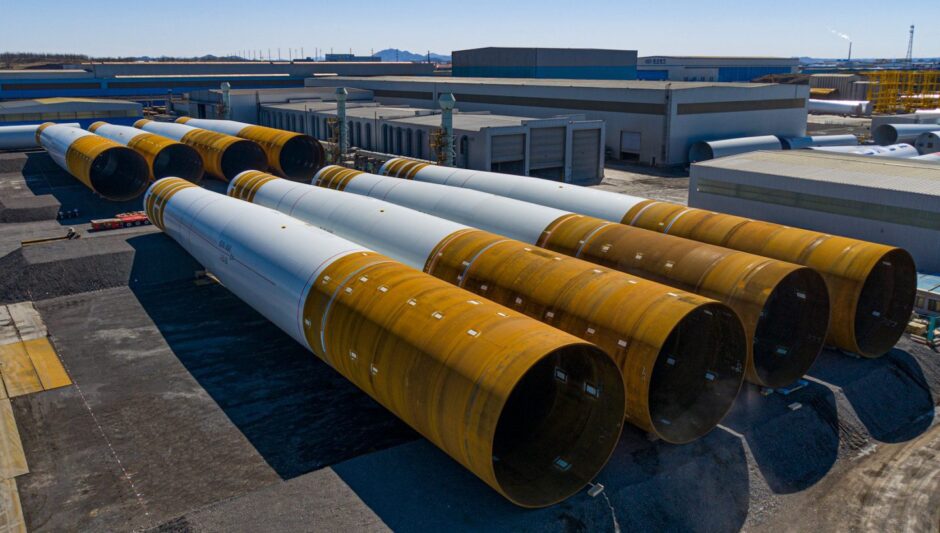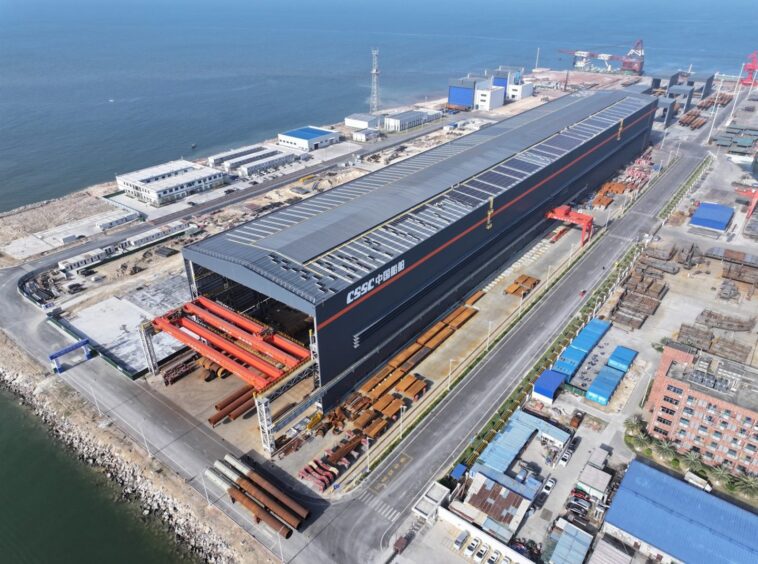
The developers of the Inch Cape wind farm have signed agreements which will see key components for the huge wind farm built in China.
Developers have signed capacity reservation agreements with a pair of Chinese fabricators for monopiles used on the project off the Angus coast.
Red Rock Power and Ireland’s ESB are behind the 1.1 GW Inch Cape scheme, who said there is no where in the UK where these components can be made.
The developers’ joint venture, Inch Cape Offshore Limited (ICOL), announced on Tuesday it had signed capacity reservation agreements with China’s Dajin Offshore Heavy Industry and Guangzhou Wenchong Shipyard Heavy Industry (GWSHI) for the project’s XXL monopile foundations.
The contracts – the value of which were not disclosed – secure the supply, fabrication and delivery of the foundations for the wind farm which the companies say is now “progressing towards full construction.”
The scheme will require up to 72 wind turbines across the site area. The XXL monopiles used will each have a maximum outer diameter of 11.5 metres and a maximum length of 110m, and will each weigh up to 2,700 tonnes.
Inch Cape have already secured consent for structures with tip heights of up to 291 metres.
Fabrication of the monopiles is due to commence in late 2024 with delivery slated for late 2025, the pair said.
Denmark’s Vestas has already been named as the preferred wind turbine supplier for the scheme.
Inch Cape last year announced the Renewables Hub at the Port of Dundee as its intended pre-assembly site and the Port of Montrose as the project’s O&M base.
ICOL last year said it hoped to complete financial closure for the project by the end of 2023, though no formal announcement has yet been made.
This year would then see all turbine parts secured, with work pre-assembling the turbine blades, towers and nacelles coming to Dundee in 2025.
First power is due at the site in 2025, with the project fully completed in 2026.
As of Q1 2024, ICOL said it has so far invested £219m across 262 UK companies, of which £98m has been committed with 105 Scottish companies. A further £700m is earmarked for spending across the UK supply chain.
‘Offshored’ contracts
The award is the latest in a series of major wind fabrication contracts to go overseas, to the vexation of unions.
When asked about the choice of fabricators for the project, a spokesperson for ICOL told Energy Voice: “GWSHI and Dajin Offshore are two of a small number of companies globally able to the XXL monopile foundations required for Inch Cape’s proposed 15MW turbines.
“There is no existing UK supplier with this capacity.”
After Ocean Winds awarded UAE-based Lamprell a major supply contract for Moray West, worth an estimated £150 million, the GMB Union said the “renewables jobs bonanza” promised by the Scottish government had “disappeared into the desert wind”.
Commenting on the Inch Cape award, GMB said it was another poor indictment of failed industrial policies by UK and Scottish ministers.
Claire Greer, GMB Scotland organiser in energy, said: “Sadly not one of our members will be shocked by the off-shoring of these contracts after so many others. They will be angry certainly, but not surprised.
“Of course, the Inch Cape windfarm should be built in the UK and, of course, it won’t because of the abject failure of both our governments to implement industrial strategies capable of creating the green energy and manufacturing jobs we have been promised for years.
“With a vision and a plan, we already have the skills and experience to drive towards net zero while creating thousands of new, well-paid jobs.
“Instead, we are left counting the cost and lamenting missed opportunities as work goes abroad and other countries benefit from our governments’ lack of ambition and record of industrial failure.”
However, developers have pointed to the lack of capacity available to undertake the work in the UK.
And while there are signs of progress – after SeAH Wind recently secured its largest ever award for its Teesside plant to supply all monopiles for Vattenfall’s Norfolk Vanguard wind project – a significant step up in facilities would be needed to meet the gigawatts of demand.
Recommended for you

 © Supplied by Inch Cape Offshore W
© Supplied by Inch Cape Offshore W © Supplied by Inch Cape
© Supplied by Inch Cape